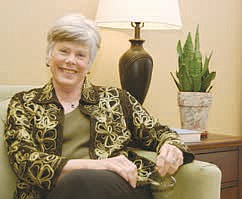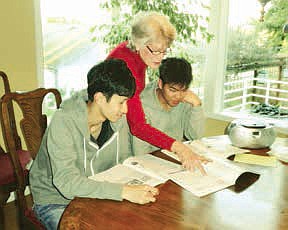Chris' Corner
July 1, 2013 at 8:00 a.m.
In July of 1966, I took a very long flight to Lae, New Guinea, where I would spend the next two years teaching English as a foreign language in a boarding school of 200 secondary students—185 boys and 15 girls. It was, as you can probably imagine, the experience of a lifetime.
The following is an excerpt from my notes made during a three-day orientation upon my arrival. Perhaps you can sense my amazement. Ancestors slept in bush houses around a fire with one eye open for any enemies that might appear. Many times they danced all night to keep awake. There was separation between males and females. Men believed if they slept with their wives they would not hunt well, dance well, etc. Sleeping on the floor is still done in the house. Most people who live in town, sleep in beds. The separation of families is not common today. The people were not clean; they used pig’s fat on their bodies because they believed it would keep them warm.
I had entered a culture so foreign that nothing, absolutely nothing, resembled the culture I had left. In some ways, I had entered the twilight zone at the age of 22. Of course, I had read about New Guinea—but reading about it, and experiencing it were very different realities. Happily, some of the other teachers there had backgrounds similar to my own, and I found that to be comforting. Together we forged a familiar community of comrades, which helped to soothe the pangs of homesickness.
I had gone there to teach English, and so I taught. Still it was the natives I went there to teach, who in fact, taught even more to me. Today I think of all the things I learned from a primitive people who bore into my soul the universal kinship of humanity. I learned that you can get places without owning a car, you can eat and be sustained by taro root, roasted grubs and turtle eggs, you can live without TV, and four hours of electricity a day is sufficient.
I loved the Friday night ritual of scrambling into bed ahead of the last gasp of electricity and falling asleep to faint sounds from the distant village of natives beating hand-hewn drums. Gathering to celebrate the end of the week, they lifted their voices in song and danced on the earthen floor to the regular and sometimes irregular beat of their drums. From my bed I celebrated right along with them...enjoying their way of life, at least for the short time I was privileged to partake of it.
My favorite story happened one Friday afternoon as I was driving the seven miles into town for groceries. An elderly New Guinean man was standing by the side of the road, relatively small in stature with a walking stick in one hand. I stopped to offer him a ride at which point he turned toward the jungle behind him. With a sweeping motion of his hand out came his whole extended family; adults, children, a couple babies, and a pig. In utter disbelief, I watched as everyone squeezed into the van and the cacophony of excited voices, crying, and pig noises lasted all the way to town. I parked the van and one by one my motley crew of passengers departed, the adults with a “tenkyu” (Pidgin
English for “thank you”), and it was just another day in the neighborhood. Imagine what I would have missed if I had gotten stuck in the “what if” mentality, and had never boarded that plane. What I learned from being present and immersing myself in the New Guinean culture was tremendous, and has enriched my life for all of my years.
In March of 2013, I had an opportunity to teach for an organization called “Live in Languages.” For one week, I hosted two Japanese students in my home. The mornings were spent in English instruction, and the entire day they were to speak only English—which was good, because I did not know any Japanese. Again I was teaching, but again I learned much—perhaps more—from those two lads than I taught. Conversation was limited but food differences and custom differences were noted. One evening they cooked dinner for me, a Japanese dish called Okonomiyake—it was delicious and nutritional and now I make it. The week was both delightful and educational. My life was enriched.
Moving into a retirement community can sometimes be a bit like moving to New Guinea. Life will be different and will require some adjustment. Still, you will find many folks there with backgrounds similar to your own and that will be comforting. With those folks, you will forge a familiar community of comrades, and that will help soothe the sadness of leaving your traditional home.
But you will also find that a retirement community is a wonderful place to be exposed to multiple generations and cultures—a place to learn from foreign residents, and foreign caregivers, that all of us, while different, are in many important ways, really the same. A retirement community is a wonderful place where you can continue to learn and better understand the struggles of others, and to become even more accepting of their differences. I heard someone say one time, “our view of the world is augmented only by our willingness to embrace it”—and I believe that is true in my own life. When we embrace differences, we understand the oneness—the kinship of us all, and we begin a journey of trust, tolerance and appreciation.
Perhaps the diversity you find in your new home at the Retirement Center will help you to see more clearly the fluidness of the world we live in, and the kindredness of us all. Perhaps your move to a retirement community will be both delightful and educational. Perhaps your life, too, will be enriched.
If you would like information about Chateau Bothell Landing or to schedule a tour and free lunch, please call Community Relations Director Mary Benz or Rob Finley at 425.485.1155 or email Mary. Benz@ chateaullc.com. Visit our website at www.chateau-bothell-landing.com






